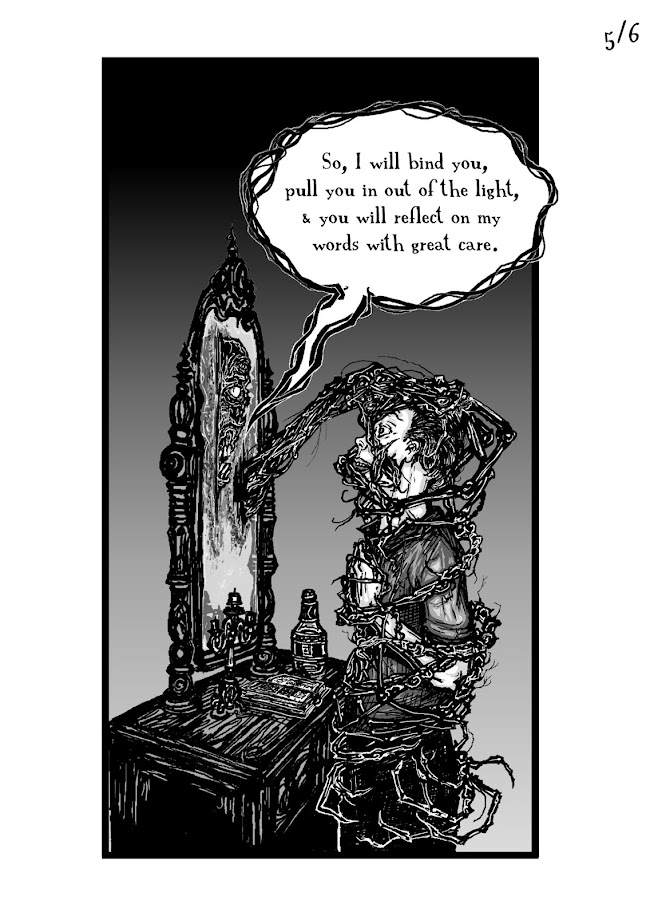About
Blog Archive
Friday, November 20, 2020
Saturday, October 31, 2020
Wednesday, September 30, 2020
The Echo of His Words
More and more of us came to listen
to the stirring words of the man who took away our sick.
I will say I already had good reason to suspect him, from an incident years ago.
The gracious among us would invite him in for cider
when he called for our elderly and infirm.
His hearse would
carry away our invalids as they lay mumbling on a stretcher in the back.
In listening to the man’s words, we were seeking health advice.
Instead, the words’ twisting echoes made us
sick.
And that in turn lead him to ferry ever more of us away.
In the end, he told me:
“The sick—I’ve put them where they’ll mumble on forever.
In the mortuary walls.”
Changelings
In summer, the lovely girls would come out to the pier
to be ogled at by the boys under the docks.
Their teacher’s warnings of disappearances along that part of the coast
failed to dissuade
them.
Though searchers were always sent out on the rocks,
this fishing town seemed resigned to a cryptic fate.
The truth beneath the silence had seeped through and bloomed into nervous minds.
Heedless, one night the twin sisters snuck out to the pier.
They dared each other to make excursions further down the rocks.
But they’d never known the kind of terror they’d soon suffer.
A half-drunken
sailor in his skiff heard the twins’ screams echo over the waves.
From the crack of a
sea cave came their cries at the things that pulled them
in.
Old men in the tavern listened to the sailor’s tale with glistening eyes,
shook their heads, turned
away.
They pretended ignorance of the cavern’s changelings,
as they were sometimes called in whispers.
Meanwhile, the slippery things restraining the sisters in darkness stood awestruck.
The sisters’
similarity astonished them.
Many digits poked one sister’s face, then the other.
A synchronized droning said: “We drink you.”
One twin, hearing her sister sobbing as digits pricked her face,
tore loose in defiance.
She heard the things’ frightened gasps.
Using this fear, the twins would come to command the cave—
as they too began to change.
Monday, August 31, 2020
What the Voice Teaches
I am the voice that tells you to pick up the scissors
and stab the sleeping old woman in the eye.
You put the thought out of your mind by switching on the TV
to a cartoon about dead children.
In another voice,
I tell you there is nothing out of the ordinary
about the creeping wish to kill.
You’ve lived enslaved to this woman for so long,
in this
house of dying shadows, why not end it?
I teach you a lesson about fate, of the strings you’re tied to,
and the act needed to cut yourself free.
Imagine the old woman was murdered and buried
before you
were even brought here and gifted to her.
With no eyes and no hands, she will be your slave, locked below.
Forever Waiting
The century-ancient siblings dwelt as recluses
in the
shuttered stone house carved into the cliff.
Seeking their rumored riches,
a sleuth came knocking,
pleading aid for her feigned accident in the night rain.
The wild-haired, stuttering brother
confusedly ushered
her through dim, smoky chambers.
In the corners loomed the other siblings’ shadows.
The tall sister whispered, “We know why you’ve come.”
Nevertheless, they showed her, in the cellar’s back wall,
a fissure opening into a wailing red cavern.
The siblings let her go inside,
confiding how they wished they could follow,
instead of waiting at the edge.
She stumbled through time,
returning decades older,
years earlier,
to join them in waiting for her own arrival.
Friday, July 31, 2020
The Empty Room
From the massive woman's mouth came a small girl’s voice,
asking us, “Did you see my baby brother?”
She’d surprised us in the hotel lobby, by the stairwell,
saying she’d been a good big sister, till she lost him.
We escaped her wheedling and got to our room at last,
but in the night we were awoken by a child’s crying.
The crying came from our bathroom pipes,
which the proprietor at length told the history of.
“‘Devil’s veins,’ locals called ‘em a century past,”
he said tapping, “when they saw ‘em installed
here.”
Half-awake, I heard the child crying again hours later.
I left my wife sleeping to follow it along the pipes.
I’d left the door ajar,
not wanting to wake her or leave her without the key.
The pipes ran along the hall ceiling and bent left and down another stair,
splitting like roots toward the
basement.
Needing to find those cries in the pipes made me abandon sense—
my wife was missing when I returned.
I close my eyes now and see
the marks her nails made in the sheets as she was dragged out.
The proprietor was disassembling electronics,
looking for bugs and finding only insects, when I ran
in.
He told me how we couldn’t leave,
an exchange had been made, none of it was his choice.
To find her, I would have to become the kidnapper of the child I’d searched for,
the horror I’d feared in the walls.
Where other guests on other floors were kept,
I heard one say, hoarsely chuckling, “Never stop believing.”
Occult Streets
We catch a glimpse of our death in the face of a stranger,
down an occult street.
Along an alien alley once,
I heard a child at a window whisper my name without opening his mouth.
A gathering under the window seemed to recognize me
and came at me with open arms.
One of them, a woman in a guard uniform,
clasped my shoulders hard, as if to detain me, then laughed.
She leaned toward a gaunt, faintly familiar man and stroked him,
grinning, watching for my reaction.
Following her inside, I found the child standing beside an urn.
All the others had withered into husks.
“Tell me what it says,” whispered the child, pointing to the urn’s inscription,
but I refused to look.
Tuesday, June 30, 2020
A Visitor’s Souvenirs
Meta-Philosophical Logic
Tuesday, May 26, 2020
A Modal Solution to the Skeptical Paradox
First, one would be right to suspect that the "cannot" in the first premise is rather strong. Some (e.g. Pritchard, 2013) have argued that the weaker formulation “one does not know one is not in a skeptical scenario” (call this SH) works well enough to get the paradox. However, it is not clear that one could get the paradox from the weaker version. If the skeptic is not claiming that one cannot know, then her interlocutor, for all she knows, does know, since it is possible to know. In order for the skeptic to say that any given person does not know, she must, ipso facto, also claim that one cannot know. Also, as long as a potential resolution is available, we do not have a strict paradox, but only a temporary obstruction. Thus, it seems that to get the paradox per se, we do need the strong version of the first premise. And it is in the strength of this premise, which actually imposes a necessity condition, that we may look for a solution to the paradox.
P1. ◊KS(~q) & ◊~KS(q) Weak Skeptical Hypothesis (WSH)
P2. □(KS(p) à KS(~q)) Epistemic Necessitation (EN)
P3. ◊KS(p) Epistemic Background (EB)
1. □KS(p) à □KS(~q) P2, Axiom K
2. □KS(p) Supposition
3. □KS(~q) 1, 2, Modus Ponens
4. ◊~KS(q) P1, Simplification
5. ~□KS(~q) 4, Modal De Morgan’s Rule
6. □KS(~q) & ~□KS(~q) 3, 5, Conjunction
7. ~□KS(p) 2-6, Indirect Proof
8. ◊~KS(p) 7, Modal De Morgan’s Rule
9. ◊KS(p) & ◊~KS(p) P3, 8, Conjunction
QED


















